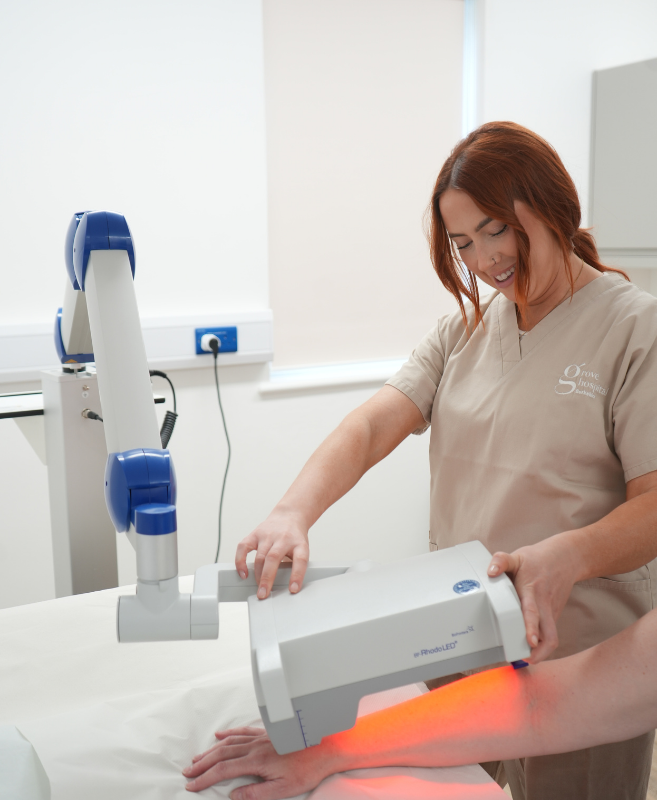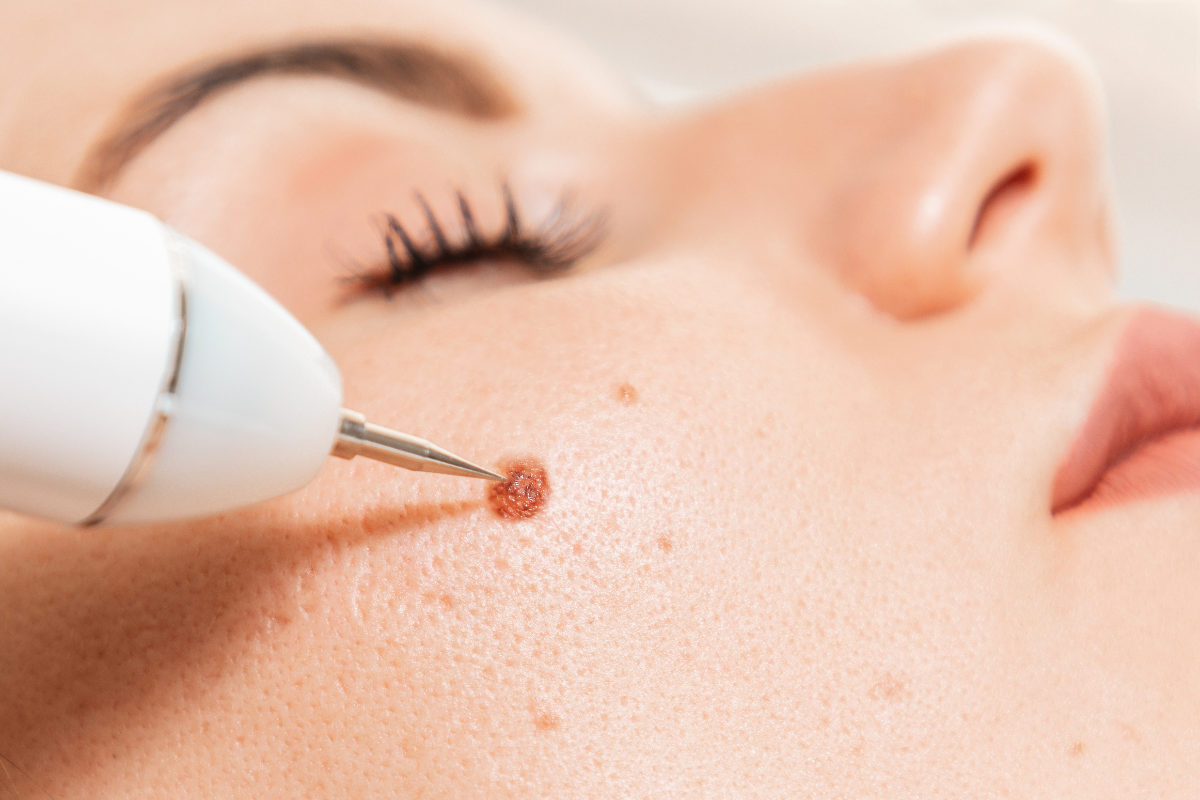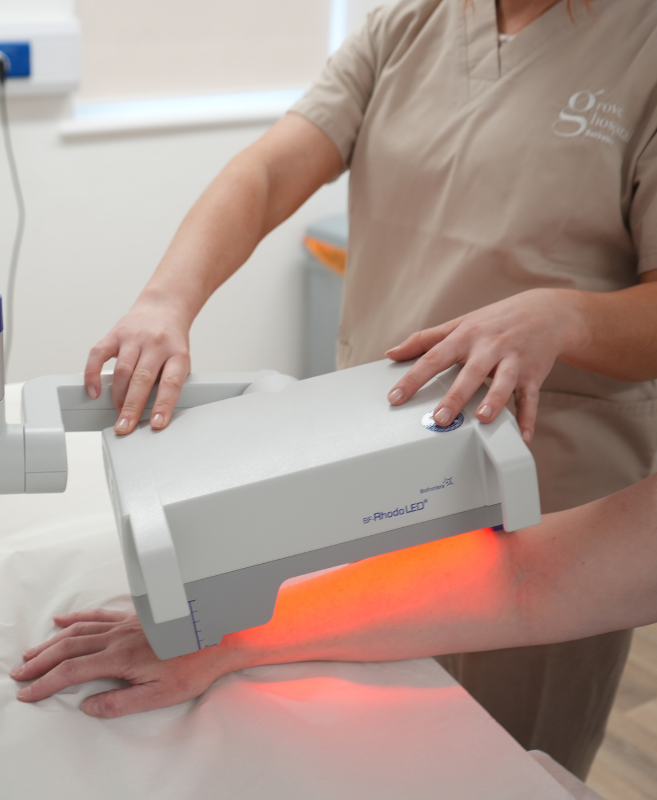
Skin cancer treatment & surgery in Berkshire, London and Surrey.
Skin Cancer Treatments & Surgery
Advanced surgical and non-surgical treatment options, delivered by skin cancer specialists.
At Apex Skin Clinic, we offer a complete range of skin cancer treatments for patients diagnosed with basal cell carcinoma (BCC), squamous cell carcinoma (SCC), melanoma, or pre-cancerous conditions such as Bowen’s disease or actinic keratosis. Whether you require a minor lesion removal, a complex skin reconstruction, or a non-invasive therapy, your care will be led by highly experienced consultant dermatologists and plastic surgeons.
Our private skin clinic is based at Berkshire Grove Hospital, providing immediate access to skin cancer surgery, advanced therapies, wound care, and ongoing support — all in one location. We are trusted by patients across London, Windsor, Eton, and the wider Berkshire and Surrey region.
Our Skin Cancer Treatments
-

Excision (Minor & Complex)
Surgical excision involves removing the skin cancer along with a safety margin of healthy tissue. For small, well-defined lesions, this may be done under local anaesthetic. For deeper or high-risk cancers, wide local excision may be performed.
-

Sentinel Lymph Node Biopsy
Recommended for some patients with melanoma, this procedure checks if cancer cells have spread to the nearby lymph nodes. It is a key staging tool and may guide further treatment decisions.
-

Lymph Node Clearance
If lymph nodes test positive for melanoma or SCC, surgical removal of the affected nodes may be required. This is typically performed under general anaesthetic and requires post-operative monitoring.
-

Reconstructive Surgery (Grafts & Flaps)
After larger excisions, or when treating skin cancers on cosmetically or functionally sensitive areas (e.g. nose, eyelids), our surgeons use advanced reconstruction techniques to restore appearance and skin function.
-

Cryotherapy
Liquid nitrogen is used to freeze and destroy abnormal skin cells. It is often used to treat actinic keratosis, early Bowen’s disease, or superficial BCCs.
-

Photodynamic Therapy (PDT)
This non-invasive technique uses a special cream and light therapy to selectively destroy pre-cancerous and some cancerous cells. It offers excellent cosmetic outcomes and is ideal for certain superficial lesions.
What We Treat
We diagnose and treat the full range of skin cancers and pre-cancerous conditions. These include melanoma, which is the most serious form of skin cancer, basal cell carcinoma, which is the most common and usually slow-growing, and squamous cell carcinoma, which can spread if left untreated. We also see early-stage conditions such as Bowen’s disease and actinic keratosis, which are considered pre-cancerous and may progress into more serious types of skin cancer if not managed early.
-
Melanoma can present in different ways depending on the subtype. It may appear as a dark mole or patch that changes over time, often becoming larger, uneven or itchy. Other signs include sores that do not heal, flaky or rough patches, or red, crusted bumps. These changes often occur on sun-exposed areas like the face, scalp, arms or back - but can also appear in less obvious locations such as under the nails, between the toes, or on the soles of the feet. Our consultants assess all atypical or changing moles through detailed clinical examination and, where needed, digital dermoscopy and biopsy.
-
BCC is the most common form of skin cancer in the UK. It often appears as a pearly bump, red patch or scab that does not heal. It tends to grow slowly but can damage surrounding tissue if left untreated. We offer diagnosis and treatment for all subtypes of BCC, using surgical and non-surgical methods, and prioritise cosmetic preservation for lesions on visible areas such as the nose, eyelids or lips.
-
SCCs may present as thickened, crusted or ulcerated patches of skin - particularly on the face, scalp or hands. These lesions carry a risk of spreading to lymph nodes and require timely intervention. Our clinic offers excision with histological assessment and, where indicated, sentinel lymph node biopsy or lymph node clearance.
-
Both Bowen’s disease and actinic keratosis are considered precursors to squamous cell carcinoma. Bowen’s disease usually presents as a slowly growing, red and scaly plaque. Actinic keratoses are rough, sun-damaged patches often seen on the scalp, face and forearms. We offer cryotherapy, topical therapies, and photodynamic therapy (PDT) as part of our early intervention strategy.
-
Keratoacanthomas are dome-shaped growths that may resemble squamous cell carcinoma but often behave less aggressively. Due to their rapid growth and similarity to malignant lesions, they are usually removed for definitive diagnosis. Our team also evaluates similar-looking lesions to ensure appropriate management - whether reassurance, monitoring or removal is needed.
-
Many patients come to us with a single mole that has changed in size, shape or colour. Others notice a non-healing sore, bleeding patch, or new skin lump. Our consultants are highly experienced in distinguishing between benign lesions and skin cancers, using dermoscopy, digital imaging and biopsy where needed.
Each lesion we see is carefully evaluated by our consultants to determine whether it should be removed, monitored, or left alone with reassurance. Our approach combines early and accurate diagnosis, expert-led treatment, and ongoing care tailored to each individual. From your first visit to long-term follow-up, you can expect clarity, compassion and clinical excellence at every step.
What to Expect from Your Treatment Plan
Once a diagnosis is confirmed, your treatment plan will be carefully developed based on:
The type, size, and location of the skin cancer
Whether the cancer is early-stage or has spread deeper
Your overall health and treatment preferences
You will be supported throughout by a named consultant dermatologist or plastic surgeon, with additional input from skin cancer nurse specialists and our in-house reconstructive surgery team. If surgery is needed, our aim is to treat your cancer promptly while preserving function and appearance.
Consultant-Led Multidisciplinary Care
At Apex Skin Clinic, your treatment is guided by a consultant-led, multidisciplinary team of skin cancer experts. Our consultant dermatologists lead on diagnosis and treatment planning, ensuring accuracy and clinical oversight from the outset.
Where more complex procedures are required, plastic and reconstructive surgeons are involved to deliver advanced excisions with a focus on both function and cosmetic outcomes.
Throughout your journey, our skin cancer nurse specialists provide dedicated support, including wound care, dressing changes, and emotional reassurance. We also collaborate with oncology and pathology partners to ensure that every patient benefits from a safe, evidence-based care pathway tailored to their individual needs.
Frequently Asked Questions
-
Most basal cell carcinomas, squamous cell carcinomas, and melanomas require surgical excision. However, for early-stage or superficial skin cancers, non-surgical methods like cryotherapy or PDT may be suitable.
-
Some patients may be eligible for non-surgical treatments such as PDT or cryotherapy. We’ll always explain your options clearly.
-
A skin graft is taken from another part of the body, while a flap retains its blood supply and is moved from a nearby area. We’ll recommend the best option for function, healing, and appearance.
-
Skin cancers often continue to grow, and delaying treatment increases the risk of spread - especially for SCC or melanoma. Early treatment offers the best outcomes.
Book Your Consultation
If you are worried about a mole, skin lesion, or changing area of skin, our team is here to help. We offer clear diagnosis, expert treatment, and continued care in a calm, professional environment. Whether you are seeking a skin cancer diagnosis and treatment plan or simply want reassurance, we will guide you with expertise and compassion.
